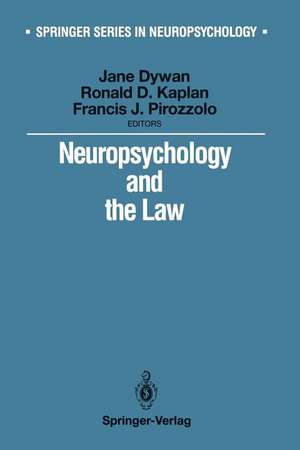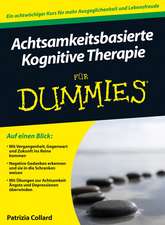Neuropsychology and the Law: Springer Series in Neuropsychology
Editat de Jane Dywan, Ronald D. Kaplan, Francis J. Pirozzoloen Limba Engleză Paperback – 5 oct 2011
Din seria Springer Series in Neuropsychology
-
 Preț: 374.51 lei
Preț: 374.51 lei -
 Preț: 384.70 lei
Preț: 384.70 lei -
 Preț: 378.83 lei
Preț: 378.83 lei -
 Preț: 379.42 lei
Preț: 379.42 lei -
 Preț: 382.41 lei
Preț: 382.41 lei -
 Preț: 380.72 lei
Preț: 380.72 lei - 15%
 Preț: 692.83 lei
Preț: 692.83 lei -
 Preț: 383.16 lei
Preț: 383.16 lei -
 Preț: 375.06 lei
Preț: 375.06 lei
Preț: 381.50 lei
Nou
Puncte Express: 572
Preț estimativ în valută:
73.01€ • 75.84$ • 60.65£
73.01€ • 75.84$ • 60.65£
Carte tipărită la comandă
Livrare economică 01-15 februarie 25
Preluare comenzi: 021 569.72.76
Specificații
ISBN-13: 9781461277989
ISBN-10: 1461277981
Pagini: 316
Ilustrații: XVI, 295 p.
Dimensiuni: 155 x 235 x 17 mm
Greutate: 0.45 kg
Ediția:Softcover reprint of the original 1st ed. 1991
Editura: Springer
Colecția Springer
Seria Springer Series in Neuropsychology
Locul publicării:New York, NY, United States
ISBN-10: 1461277981
Pagini: 316
Ilustrații: XVI, 295 p.
Dimensiuni: 155 x 235 x 17 mm
Greutate: 0.45 kg
Ediția:Softcover reprint of the original 1st ed. 1991
Editura: Springer
Colecția Springer
Seria Springer Series in Neuropsychology
Locul publicării:New York, NY, United States
Public țintă
ResearchCuprins
1 Neuropsychology and Its Applications to the Legal Forum.- Mental Illness Versus Incompetency.- Competence Versus Responsibility.- The Scientific Basis of Neuropsychology.- The Nature of Science and the Needs of the Court.- The Psychometric Methods of Neuropsychology.- The Neuropsychological Assessment.- Summary and Conclusions.- 2 Minor Head Injury and the Post-Concussive Syndrome.- The Importance of Interviewing Collaterals.- Some Special Considerations Regarding Assessment of Children.- Frontal Lobe Tests.- Anosmia and Parosmia.- Dichotic Listening.- The Minnesota Multiphasic Personality Inventory.- Psychodiagnostic Assessment.- Conclusion.- End Notes.- 3 Workers’ Compensation and Clinical Neuropsychological Assessment.- Workers’ Compensation and Neuropsychological Information.- Role of Clinical Neuropsychology in Workers’ Compensation.- 4 Assessing the Neuropsychological Abilities of Children and Adolescents for Personal Injury Litigation.- Neuropsychologists and Personal Injury Litigation.- Existence of Neuropsychological Impairments.- Consequences of Neuropsychological Impairments.- Causes of Neuropsychological Impairments.- Issues Unique to Children.- Conclusion.- 5 The Assessment of Competency in the Older Adult.- Normal Aging.- Diseases and Disorders.- Assessment.- Summary and Conclusions.- 6 Legal Applications of Electrophysiological Assessments.- Quantitative Measures of Brain Function.- Assessment Needs in Litigation Proceedings.- Further Applications for Electrophysiological Data.- Obstacles and Precautions in the Use of Electrophysiological Data.- Summary and Conclusions.- 7 The Use of Neuroimaging Techniques in Brain Injury.- Techniques.- Regional Brain Function and Behavior.- A Method for Integrating Behavioral and Neuroimaging Data.- PresentLimitations and Future Steps.- Implications for Legal Practices.- Conclusions.- 8 The Problems of Prognpsis.- Epidemiology of Brain Trauma.- The Relevance of the Animal Literature.- Neural Responses to Injury.- Mechanisms Associated with Neurological Recovery.- The Problem of Localization.- Focal Versus Diffuse Effects.- Variables Affecting Recovery.- Situations in which Further Deterioration can be Expected.- Prognostic Strategy.- 9 Can Competencies be Retrained? A Critical Appraisal of Cognitive Rehabilitation.- Cognitive Competency.- Cognitive Incompetency and Rehabilitation.- Contextual Considerations.- Evaluating Cognitive Rehabilitation: General Issues.- Can Cognitive Competencies be Retrained?.- Rehabilitation and Psychosocial Problems.- Overall Effectiveness of Cognitive Rehabilitation.- Conclusions.- 10 Developing Legislation and the Concept of Disability.- Outdated Concepts and Their Implications: The Case of No Fault Automobile Insurance in Ontario.- The Tort System with No Fault Add On in Ontario.- History of the Debate on Automobile Insurance in Ontario.- The Disability Assessment Model 268 From the Rehab Setting to the Neuropsychological/Legal Evaluation.- Author Index.













